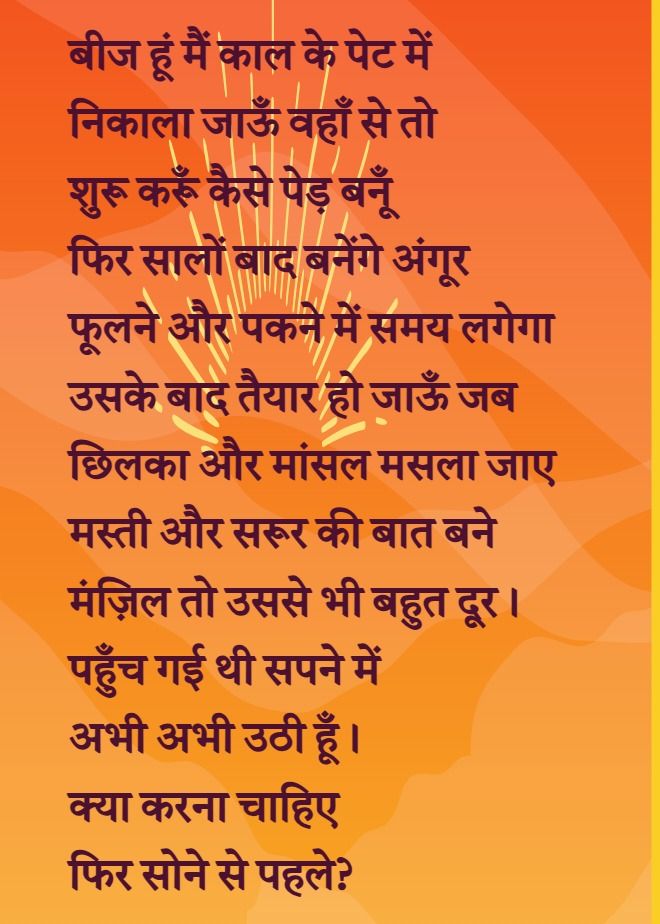Beej Hoo Mai Kaal Ke Pet Me


बीज हूं मैं काल के पेट में
बीज हूं मैं काल के पेट मे
निकाला जाऊँ वहाँ से तो
शुरू करूँ कैसे पेड़ बनूँ
फिर सालों बाद बनेंगे अंगूर
फूलने और पकने में समय लगेगा
उसके बाद तैयार हो जाऊँ जब
छिलका और मांसल मसला जाए
मस्ती और सरूर की बात तो दूर
मंज़िल तो उससे भी बहुत दूर
पहुँच गई थी सपने में
अभी अभी उठी हूँ
क्या करना चाहिए
फिर सोने से पहले?
Hindi Poem Analysis
It's a beautiful poem, rich with imagery and a sense of introspective journey! There are no grammatical errors or incorrect word choices. However, a few minor adjustments could enhance the flow and poetic impact.
Here's an analysis of the poem, followed by a slightly revised version with explanations for the changes:
Analysis of the Original Poem
The poem powerfully conveys the journey of self-discovery and growth, using the metaphor of a seed transforming into a grapevine and eventually wine.
* "बीज हूं मैं काल के पेट में" (I am a seed in the womb of time): This opening line is striking, immediately setting a tone of potential and gestation. "काल के पेट में" is a vivid and poetic phrase.
* "निकाले जाएं वहां से तो / शुरू करूं कि पेड़ बनू" (If I am taken out from there / I should start to become a tree): This highlights the nascent stage of decision and the beginning of the growth process.
* "फिर सालों बाद बनेगा अंगूर / फूलने और पकने में समय लगेगा" (Then years later grapes will form / It will take time to flower and ripen): This effectively conveys the long, patient process of development, emphasizing the commitment required.
* "उसके बाद तैयार हो जाऊं कि / छिलका और मांसल मसला जाएं" (After that, I should be ready for / The skin and flesh to be crushed): This is a powerful and somewhat raw image, representing the trials and transformations necessary for ultimate realization.
* "मस्ती और सरूर तो दूर कि बात / मंजिल तो उससे भी बहुत दूर" (Ecstasy and intoxication are far away / The destination is even further than that): This line introduces a sense of the vastness of the journey and the distance to true fulfillment, beyond immediate pleasures. The "कि बात" feels a little conversational for a poem, but it's not incorrect.
* "पहुंच गई थी सपने में / अभी अभी उठी हूँ" (I had reached in a dream / I just woke up): This is a brilliant transition. It grounds the abstract journey in a personal experience, suggesting a glimpse of the future or a desired state, followed by a return to present reality.
* "क्या करना चाहिए / फिर सोने से पहले।" (What should I do / Before sleeping again.): This ending is introspective and open-ended. It poses a direct question to the self, a call to action or contemplation before the cycle of rest and potential continues.
The poem's strength lies in its metaphorical depth, its exploration of patience and transformation, and its introspective tone. The flow is generally good, and the language is evocative.
This poem beautifully captures the long, often arduous, yet ultimately rewarding journey of self-actualization. It's a reminder that true growth and fulfillment require patience, resilience, and a willingness to undergo transformative experiences. What aspects of this journey resonate with you the most?
